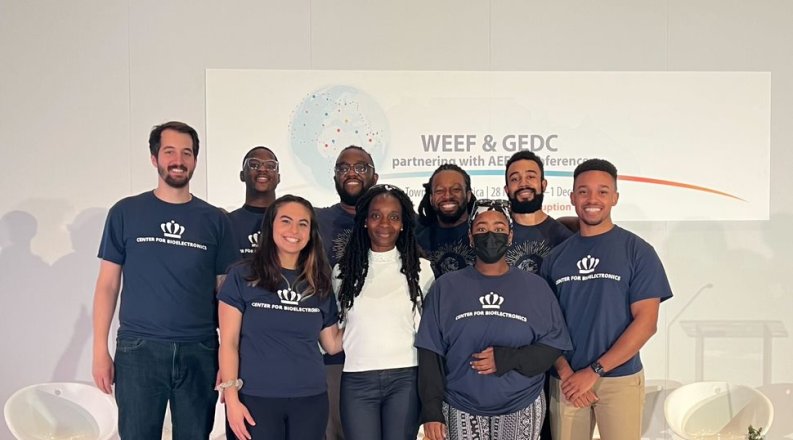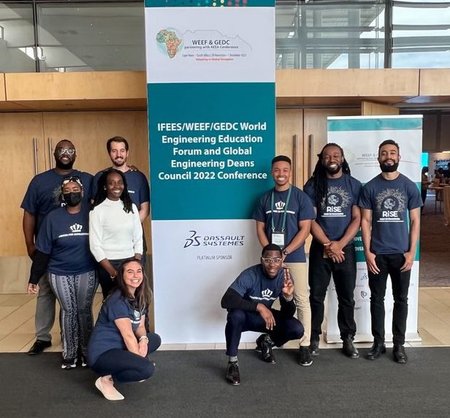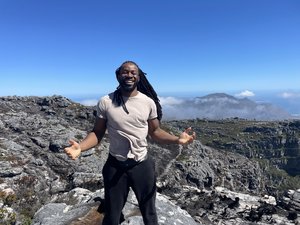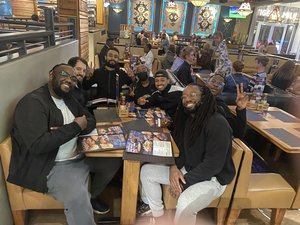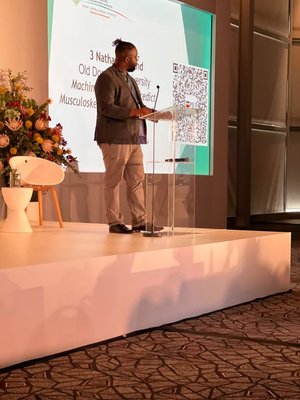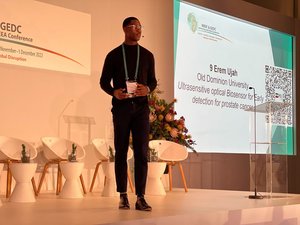By Joe Garvey
When Erem Ujah, a biomedical engineering scholar at Old Dominion University’s Center for Bioelectronics, arrived in Cape Town, South Africa, for the World Engineering Education Forum and Global Engineering Dean Council, he said “he didn’t know what to expect.”
He and the rest of the ODU group that made the trip came away with an unforgettable experience.
“It was very inspiring,” said Ujah, who was born in Nigeria but had never been to South Africa. “It was like, ‘There’s more to come.’ I could travel to more places and do more fun things like this. There’s more than where I’m based.”
Ujah was one of eight Ph.D.-track students in ODU’s Graduate Research Training Initiative for Student Enhancement (G-RISE) program who made the trip. Jaylynn Anasco, Christopher Animashaun, Alexander Hunt and Marcus Easterling are also biomedical engineering students. They were joined by Nathan Holland (mechanical engineering), Layla Rashad (biomedical sciences) and Brian Hanson (computer science).
The G-RISE program at ODU, which accepted its first cohort in 2021, is designed to increase diversity among students pursuing Ph.D. degrees in biomedical research-related disciplines.
Gymama Slaughter, director of the Center for Bioelectronics, said the trip was part of a collaboration with the University of Maryland, Baltimore County, and the University of California, Davis, called the Global Promise Engineering Institute Alliance, which aims to increase the number of minorities in STEM fields. Professor Jamie Gurganus and Vice Chancellor of Diversity, Equity and Inclusion Renetta Tull lead the efforts at UMBC and UC Davis, respectively.
Slaughter learned about the conference from her mentor, Janet Rutledge, vice provost and dean of the Graduate School at UMBC, in September and worked with ODU’s Center for Global Engagement as she sought funding for the trip. The Center for Bioelectronics and the Graduate School also provided financial support for the program’s first international trip. They left on Nov. 25 and returned Dec. 3.
“Most minority students have not been outside of the U.S., let alone having been to Africa,” Slaughter said. “The opportunity to take them to Cape Town was really exciting. I felt like I had to do everything I could to get them there.”
Ujah and Holland were among 10 students who gave Three-Minute-Thesis-style presentations at the conference.
Holland, whose research focuses on biomechanics – specifically using machine learning to try to predict lower-extremity activity levels – knew he would be presenting at the conference. Ujah, who is working on developing ultra-sensitive biosensors that would detect prostate cancer in less-invasive ways than current methods entail, did not. Slaughter encouraged him to present after a spot opened.
“It was definitely interesting,” Ujah said. “You had to talk about the background, what you’re trying to do and convey everything in three minutes.”
“That was a lot of pressure,” Holland added.
The students made many valuable and meaningful connections at the conference.
Hanson met an employee at the hotel where the students stayed whose 8-year-old niece had diabetes.
“I could not believe that this was their reality,” Hanson said. “I told him more about my personal research, which aligned to the disparity that his niece was experiencing with diabetes, and he felt a sense of hope to know that someone was aware of this problem and was developing a solution.”
Ujah connected with Karin Wolff, engineering teaching and learning advisor at Stellenbosch University in Cape Town, and they discussed the possibility of his returning to South Africa for an internship this summer.
Rashad met a UMBC student “who is conducting research similar to my own in working with a microorganism.”
And Holland met Stephanie Adams, dean of the Erik Jonsson School of Engineering and Computer Science at the University of Texas at Dallas and former dean of ODU’s Batten School of Engineering and Technology.
He attended her presentation on strategic planning, which was primarily intended for deans.
“I was very participatory in her session; she even started to call on me by name because of my feedback,” he said. “At some point she said something to the effect of, ‘and we have a future dean sitting amongst us.’ Her comment hit me in a direct way; I was not expecting it. But I left knowing that I want to do high-level academic administrator work like a dean in my career.”
He added that UMBC faculty and staff suggested he consider seeking a job there after he graduates in December.
Along with the conference, the students raved about experiencing the culture and scenic beauty of South Africa.
They described South Africa as culturally diverse. Residents speak 11 languages, but many people spoke English. They tried variations of food from around the continent, including ostrich.
“I gained a lot of knowledge from this conference and enjoyed Cape Town’s various attractions in entertainment, food and shopping,” Rashad said.
And the landscape was spectacular.
“As I ate the food from local restaurants and viewed the sights of high-rising mountains that transitioned into beautiful beaches and the ocean, I felt like I had the best of everything I could have imagined that a single environment could offer,” Hanson said.
Holland described going to the Cape of Good Hope and being able to see where the currents from the Atlantic and Indian oceans meet, and seeing African penguins, an endangered species, along the coast. Ujah recalled a hike he and UC Davis students took up 3,563-foot Table Mountain.
“When we got close to the top of the mountain – such silence,” Ujah said. “It’s incomparable to anything I’ve ever felt before. I felt so at peace.”
Still, it didn’t feel completely foreign.
“It was interesting because even with all of the landscape and the history there, it had a Westernized feeling to it as well,” Holland said. “So, it could remind you of America, but they still have their own distinguished culture.”
Perhaps Easterling summed up the trip best.
“Every aspect of our visit added up to a once-in-a-lifetime trip that I will always remember incredibly fondly,” he said. “I am forever grateful for that wonderful opportunity to network and otherwise professionally develop myself, and to see a little bit of the beautiful country of South Africa.”
So, will there be another trip?
“Well, we have to,” Slaughter said. “I think we’re doing it every year. We started a tradition.”



